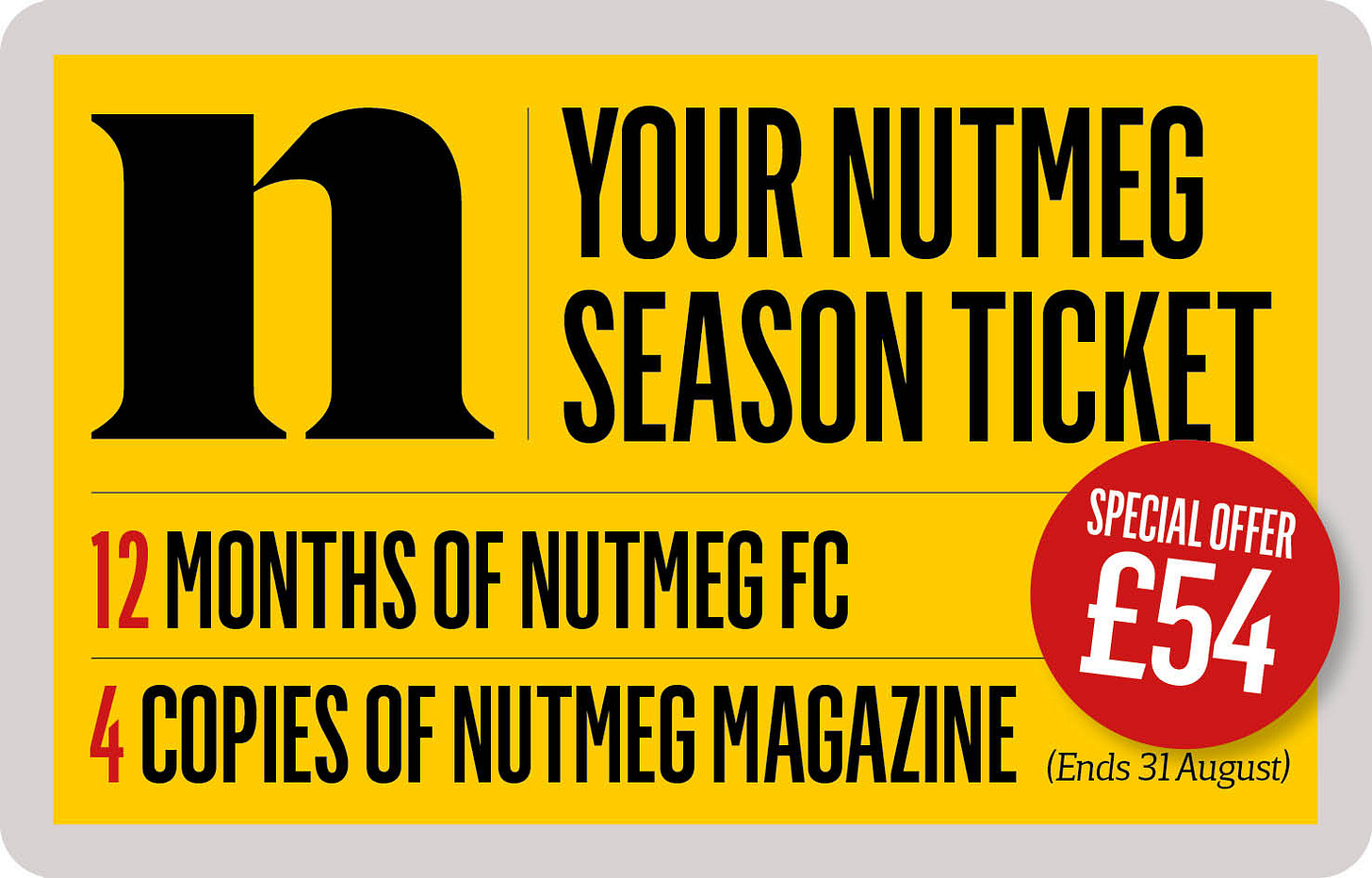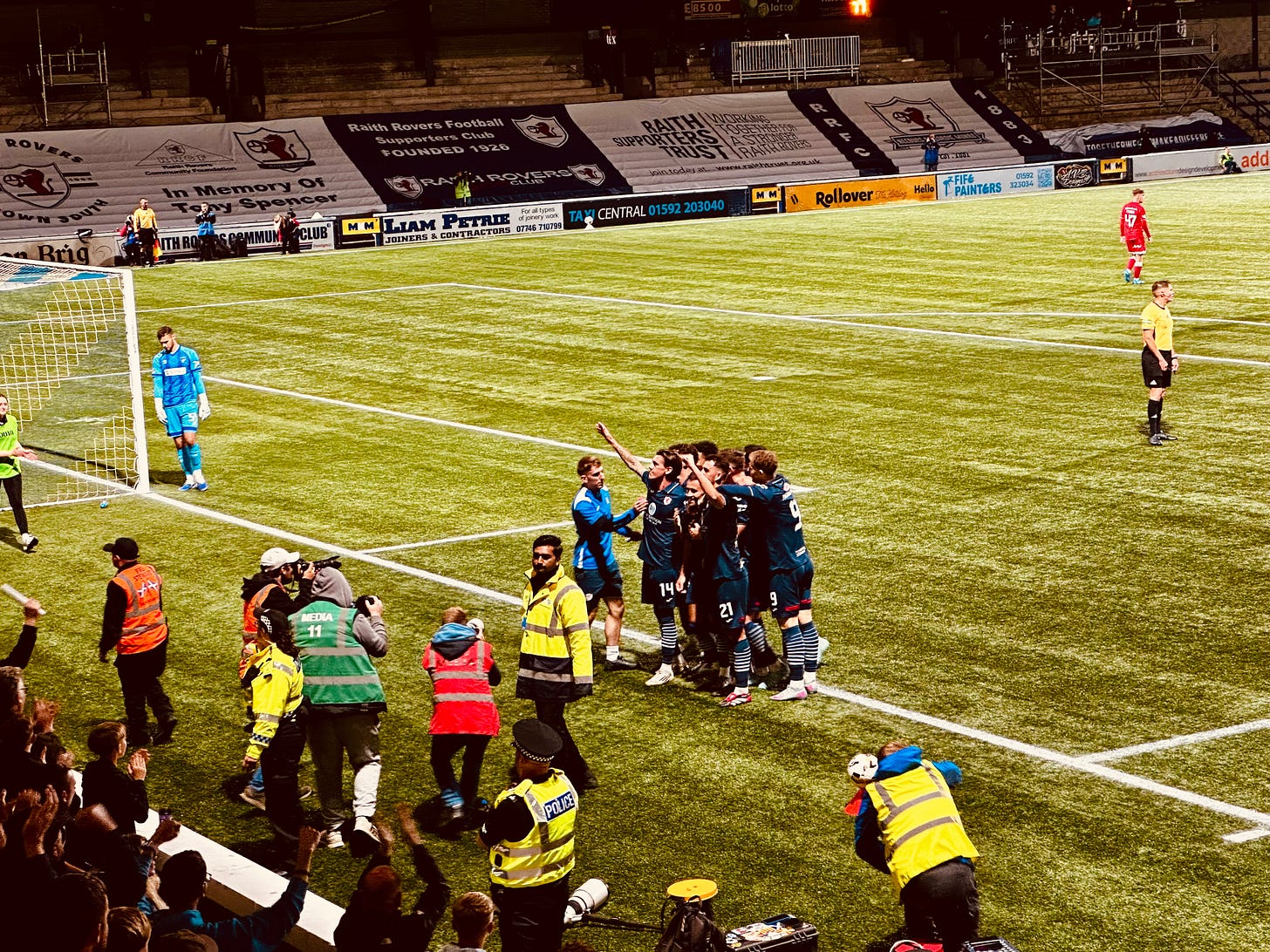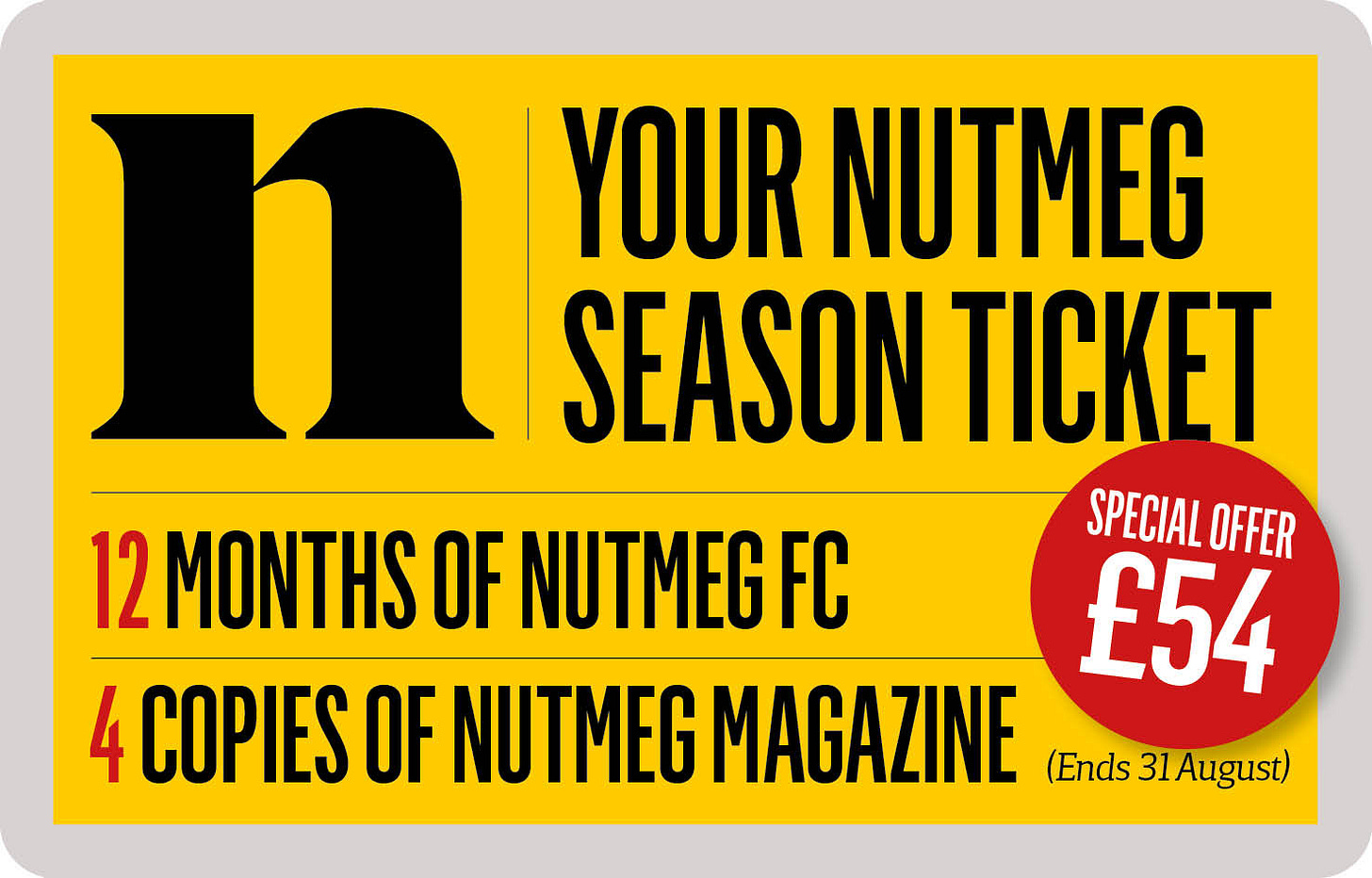The Slow Match Report: Raith Rovers 2 Dunfermline Athletic 0
Bucket collections, head tennis, an early derby goal, curious seagulls, Neil Lennon, David Dickinson (no, not that one)… it’s good to be back
This Slow Match Report is free, but next month’s will be paid, together with the monthly data breakdowns from Nick Harris, Adam Clery’s tactical analysis and Stephen McGowan’s investigations. Sign up for your Nutmeg Season Ticket before the end of August to get 12 months full digital access PLUS a year’s subscription to the beautiful, 200-page print quarterly delivered straight to your door.
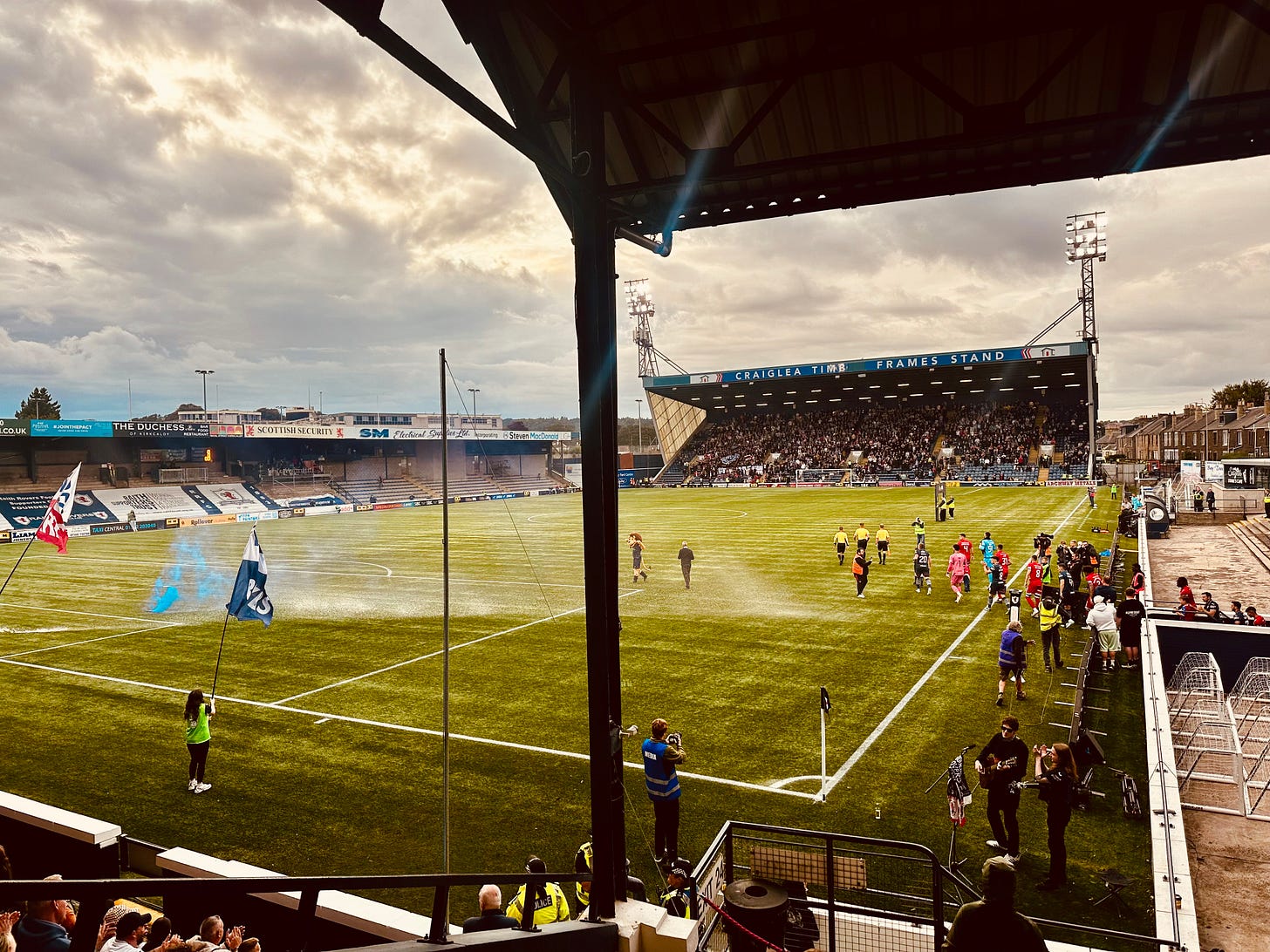
With summer’s lease almost expired, clouds lunged across the sky over Kirkcaldy on Friday evening. It did not feel like the football season’s beginning, more as if we had skipped to October with all its seriousness and lack of excuses. Yet August it is and our dearly beloved teams are still budding. Squads are not settled and the league table is a folly.
Just after seven o’clock a swarm of visiting young Pars tumbled down Pratt Street towards Stark’s Park, happy to be once more wailing their songs of love and hate. The police were many, problems few. Officers looked bored. Their horses thought about their career choices. I peered at the back of black hoodies and once more wondered what on earth the Represent Owners’ Club is. Manure scents mingled with sickly vape aromas and kids shook buckets in aid of their Sunday team. Football was back, and back with a derby night sheen.
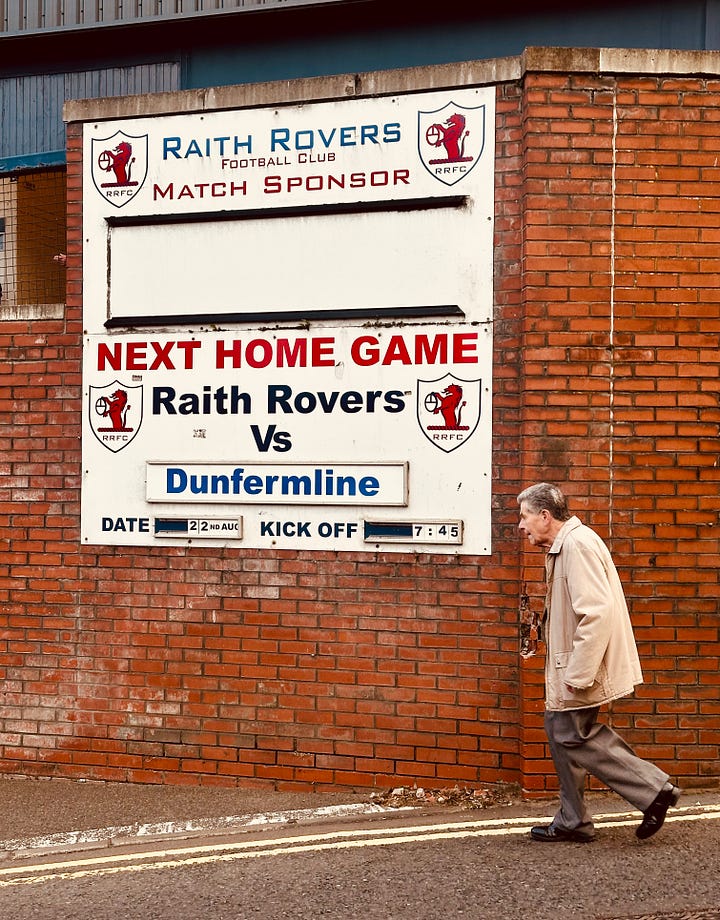
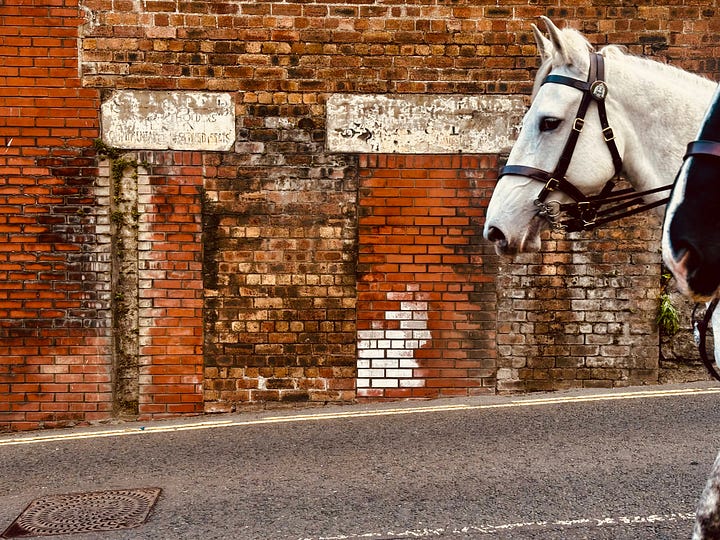
Up by the Main Stand more change plinked, this time pound coins toppling into ice cream containers repurposed for the 50/50 draw. A twenty-something man suddenly lost grip of his ticket and a breeze whisked it away from him. “That’s the winner!” he cried while chasing and finally retrieving it. He then clasped it with the determination of Charlie Bucket running home from the sweetshop and made off for the South Stand. There he would have encountered a queue animated by the presence of a baby seagull, apparently awaiting its chance to beak open the turnstiles and watch the match. “Surely he can just fly in for free if he wants,” remarked one woman in a surprisingly serious tone.
Inside, the players — Rovers in traditional deep blue, The Pars wearing an all-red away outfit — strolled out on to the plastic. Having performed their meet-and-greet obligations, they burst suddenly across the pitch like sheep running from an electric fence. The noise grew raucous and swollen. Humans and seagulls had filled the South Stand and 2,000 travellers concocted a pulsating away end. Referee David Dickinson — not him, but all the same an enduring image to conjure — blew the whistle and Fife was at war.
Conflict began in the no man’s land of the middle third. The teams headed the ball to each other a remarkable seven times in 10 seconds, a phoney war of straining necks and ruffled hairstyles. Then from the mire and with not a full minute yet on the clock, Dylan Easton — the slight, clever and sprightly Rovers forward — won possession from Jeremiah Chilokoa-Mullen. The Pars defender chased and lunged but Easton wisped off towards the penalty area, a kid dashing from a knock and run. On arrival, he dodged again and helped the ball to Paul McMullan. McMullan pushed it across the six-yard box. Left wing-back Lewis Stevenson was there, unmarked, but for milliseconds you could hear disbelief in home end howls — surely not, surely we can’t score this early in a derby. Stevenson disagreed and Raith were one up. Silence in the away end, throaty bedlam elsewhere.
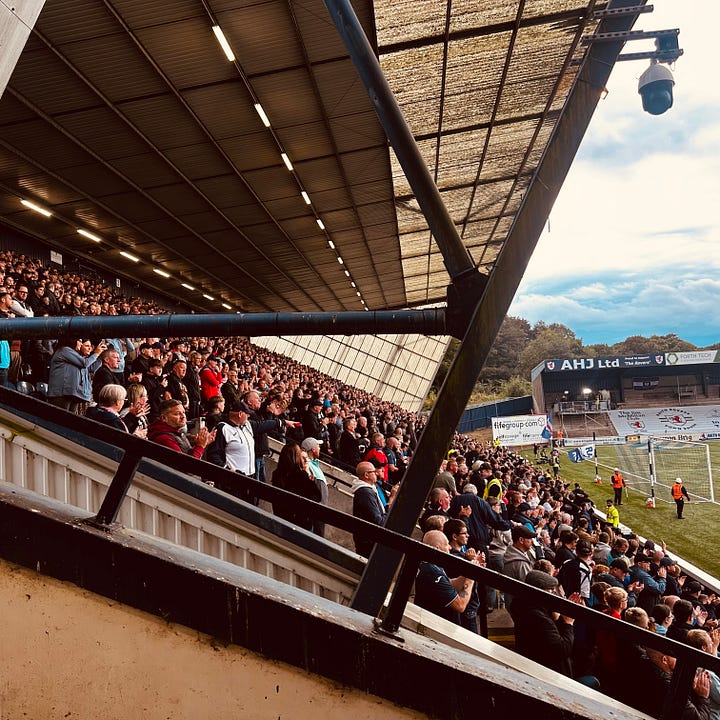
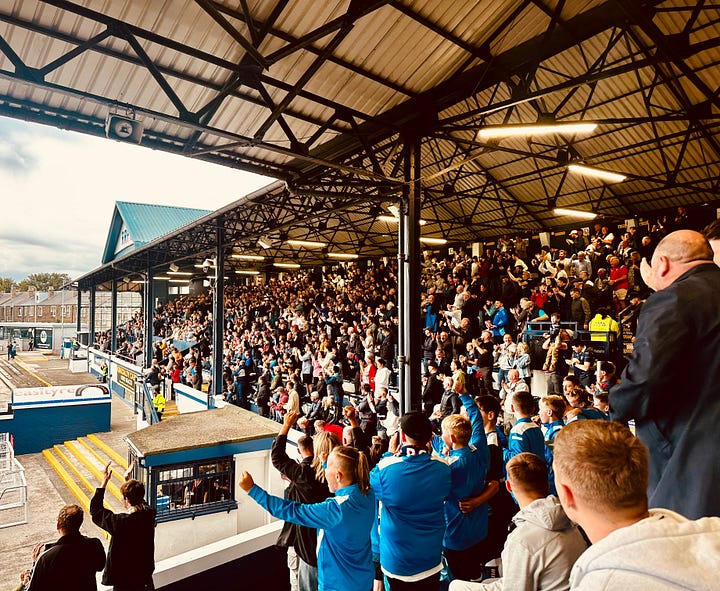
After the goal, Rovers continued to shovel a route forward. Their opponents were floppy, bumbling. Exasperated visiting forward Andrew Tod scooped a shot from almost the halfway line. It troubled no one. Through the opening 15 minutes, Tod’s manager, Neil Lennon, moved forwards incrementally. First Lennon shuffled from dug-out to edge of technical area. Then he breached its white markings and eventually teetered over the touchline during a break in play. Had this gradual progression continued, by half-time the Northern Irishman would have been in the centre-circle, resembling a mum sent to stop a street game and retrieve her child.
Thus far, the atmosphere and indeed match itself had lacked the thunder of a typical derby. It was more a polite conversation than the argument we in the cheap seats wished it to be. Then Stevenson and Tod collided in the air. Pars supporters made their first true noise since kick-off, baying in anger and offering a round of “Ye’ dirty Rovers bastards”. Stevenson looked apologetic, the father who has accidentally thrown a frisbee in his daughter’s face. A yellow card followed, booed mightily from Pars quarters.
Surely the game would now spew venom and lava. Not a chance. From the menu we were served only head tennis, grumpy fouls and a man near me leaning back having forgotten we were in bucket seats and colliding with the shins behind. Two adult seagulls swooped over, possibly looking for their son, now vaping behind the stand in a Represent Owners’ Club hoodie. The match they flew above had once again retreated to the middle chunk of the pitch, both sides cancelling each other out. This, though, was not in the manner of a game of chess, as is so often observed of these tight encounters; more a spot of rainy-day caravan Uno.
Rovers manager Barry Robson attempted to rouse his players with wild gesticulations, throwing his arms around like a mime artist on speed. Lennon looked not angry, but disappointed. Dickinson peeped for half-time. Raith’s players moved swiftly from the field like wedding guests at evening buffet opening time. Dunfermline’s resembled 11 boys sent to the headmaster’s office.
The second half began with more vim, both teams now recalling that to pass well is no sin. For Raith, McMullan was released through on goal. The rapid striker tried to lob Mason Munn but his touch was weak — that of someone trying to push open a door with their foot — and the keeper saved. Dunfermline finally had a second shot of their own in Connor Young’s free-kick from the centre of goal 25 yards out. The ball, however, soared over the bar and nosedived into the away end.
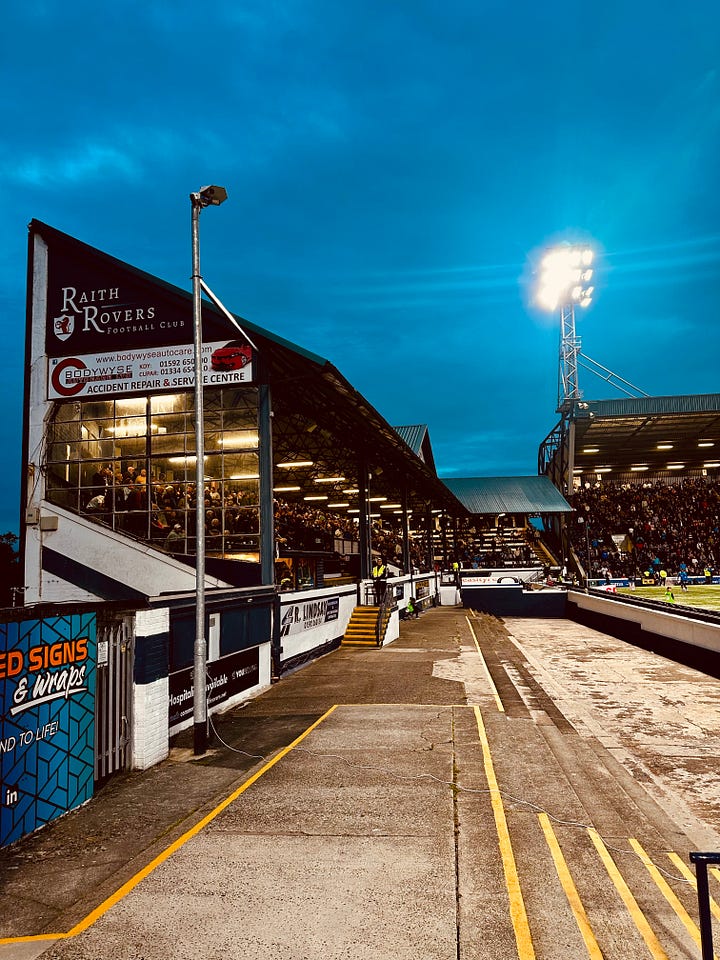
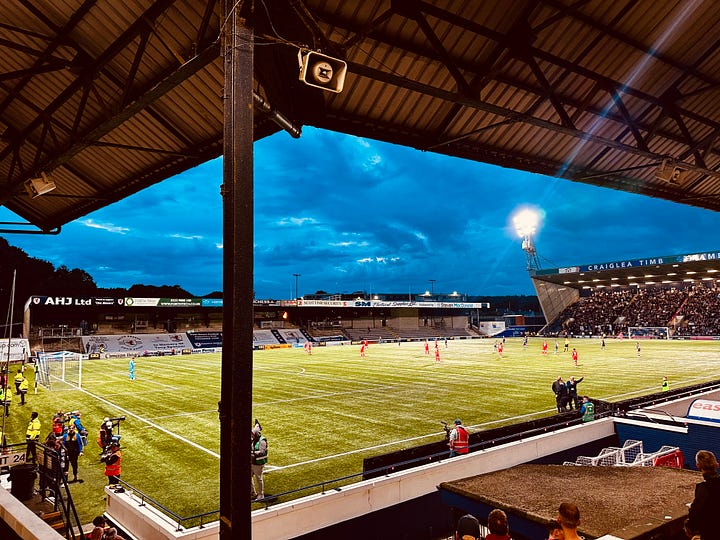
Time moved on, the sky darkened and trains with golden lit windows swished by on the railway line that snares Stark’s Park. Raith became fidgety and occasionally Dunfermline threatened. Yet that threat was vague, whispered rather than barked. There was some inevitability about Rovers’ second goal, which arrived with 13 minutes remaining. It was an almost tired, autopilot strike — a throw-in from Stevenson and a lashed, if measured, first-time shot from Lewis Vaughan which flopped into the net with a shotput trajectory. In the blue ends and corners, and beneath the regal old rafters of the Main Stand, they bounced, hugged and hollered. Tonight, Fife was theirs.
Soon, the final whistle had shrieked. They rolled off into the black night, floodlights glowing on the backs of their eyelids and a North Sea wind flicking their ears. Later, many would be toddling home with celebratory beer on their breaths. They were back in the habit, and it felt exquisite.



